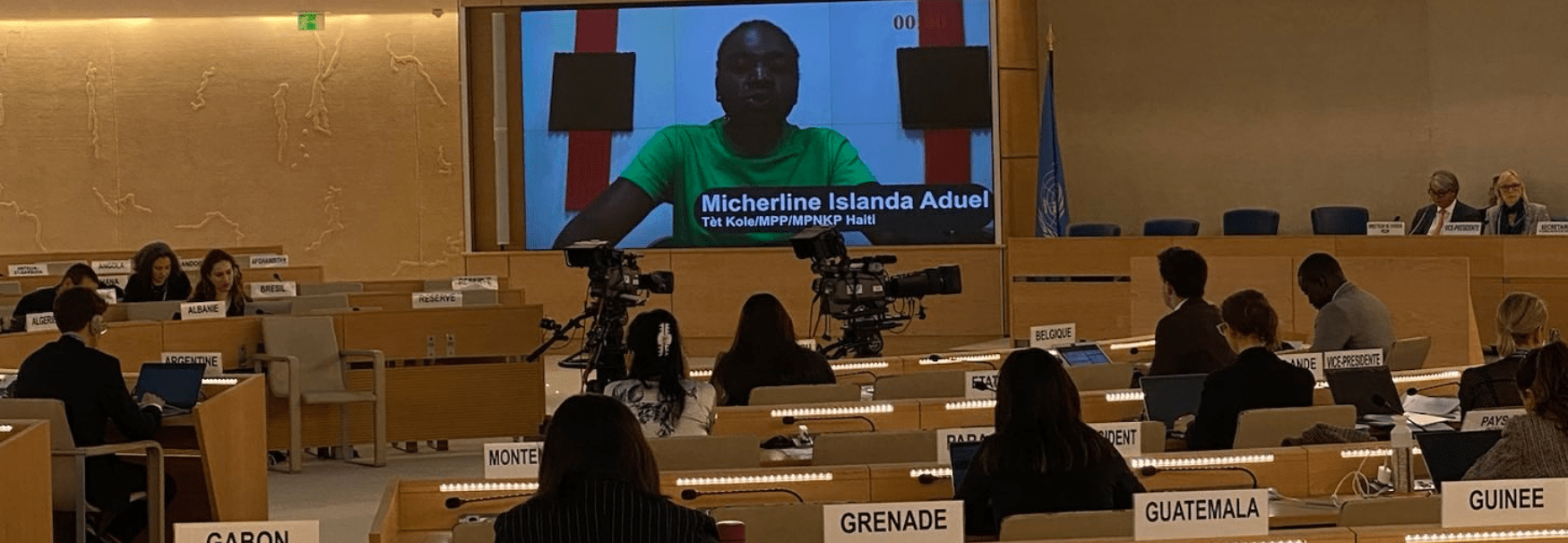Fully intertwined with current geopolitical dynamics, the anti-(neo)colonial struggle in Haiti is central. Confronting existential challenges, the Haitian people engage in a protracted struggle for emancipation and self-determination. This endeavor necessitates a robust and mobilized internationalist solidarity movement. Dominant imperialist forces persist in asserting control over the small Caribbean island to gain strategic advantages, thwarting Haiti’s path to true independence and national sovereignty.
The current situation in the country is marked by unprecedented violence and systematic human rights violations, disproportionately affecting vulnerable populations, particularly those from lower classes and rural communities. With half of the nation now under the sway of criminal gangs, manipulated by the national oligarchy aligned with imperialist interests, dissent is confined and social unrest quelled. In response, Haiti’s social movement, comprising peasant organizations, progressive political entities, unions, and feminist groups, collectively organizes to carve out autonomous spaces for self-centered development. These alternative models to the prevailing racist and neo-colonial paradigm are perceived as disruptive, prompting the targeting of the social movement by imperialist and neo-colonial forces, hence the exploitation of criminal gangs.
In Haiti’s context, the United Nations has historically played a deleterious role. Under its auspices, interventions spanning three decades have exacerbated rather than alleviated the nation’s plight. These so-called “peacekeeping missions,” ostensibly aimed at restoring political stability and combating corruption, have only further destabilized the situation. The UN Security Council’s recent proposal for a foreign military intervention to tackle the country’s gang problem underscores this point.
Haitian social movements caution against this latest attempt at foreign interference, masquerading as UN intervention, or more accurately, under the guise of the “UN Core Group on Haiti.” This self-appointed intergovernmental entity, comprising countries like the United States, France, the United Kingdom, and Canada, has effectively controlled Haitian politics since 2004, following the US and French-backed coup against President Aristide. It represents not the UN or the so-called “international community” but rather the strategic interests of the dominant imperialist system, primarily led by the United States.
Principal Haitian peasant organizations affiliated with La Via Campesina – Tet Kole Ty Peyizan Ayitien, Mouvement paysan papaye (MPP), and Mouvement paysan national du congrès papaye (MPNKP) – along with other members of the international peasant movement, mobilize across all fronts to oppose the military intervention plan, with support from internationalist solidarity organizations.
La Via Campesina initiated a solidarity campaign with the Haitian people in late 2023. Within this framework, advocacy efforts have extended to the international human rights system, with support from the CETIM, which has accompanied Haitian peasant organizations at UN forums. The Haitian social struggle also entails establishing a balance of power at the international level, with the UN serving as a primary battleground.
During the 55th session of the UN Human Rights Council, the CETIM and Haitian peasant organizations submitted a report on the country’s human rights situation, shedding light on the deep crisis afflicting the nation. This report delved into the colonial roots of the crisis, the history of foreign interference, and articulated specific demands addressed to the Human Rights Council.
Subsequently, Micherline Islanda Aduel, representing Haitian peasant organizations, CETIM, and FIAN International, addressed the Human Rights Council’s plenary meeting during a debate on Haiti’s situation. Emphasizing the need to “allow legitimate democratic institutions, social movements, and political organizations to take the necessary measures to restore the country to the path of peace and democracy,” her intervention underscored the imperative of Haitian agency in addressing the crisis.
Primary demands presented to the UN revolve around rejecting imperialist military intervention, upholding Haiti’s independence and territorial integrity, and ensuring the participation of social movements in the future democratic transition process. Attention was also drawn to the dire situation in rural areas, highlighting the urgent need to revitalize agricultural production while safeguarding the rights of peasant and rural populations, guided by the UN Declaration on the Rights of Peasants and Other People Working in Rural Areas. This declaration is poised to serve as a compass and a political and legal lever for the interests of the marginalized, fostering a path towards rebuilding Haiti on principles of social and climate justice.
LONG LIVE SOVEREIGN HAITI! LONG LIVE THE PEOPLE’S STRUGGLE FOR A HAITIAN SOLUTION FOR HAITI! LONG LIVE SOLIDARITY AMONG ALL PROGRESSIVE ORGANIZATIONS FIGHTING FOR SOCIAL JUSTICE!
For further information:
Micherline also participated in a public conference in Geneva titled “Anti-Colonial Struggles in the Global South: A Peasant Perspective,” alongside peasant representatives from Niger, Colombia, and Palestine. This event aimed to explore peasant perspectives on the intersections between anti-colonial struggles and the pursuit of food sovereignty.
Watch the webinar on the situation in Haiti, organized by La Via Campesina: https://vimeo.com/924141686
Read the article “Haiti: Call for Resistance and Solidarity with the Haitian People for a Transitional Government”: https://viacampesina.org/en/haiti-call-for-resistance-and-solidarity-with-the-haitian-people-for-a-transitional-government/
Read the article “Solidarity Declaration: Stop Neocolonialism! No to Foreign Interventions in Haiti”: https://viacampesina.org/en/declaration-of-solidarity-stop-neocolonialism-no-to-foreign-interventions-in-haiti/

